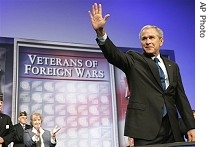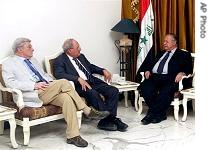2007年VOA标准英语-Bush Backs Iraqi Leader in Speech to US Veteran
搜索关注在线英语听力室公众号:tingroom,领取免费英语资料大礼包。
(单词翻译)
By Scott StearnsWhite House
22 August 2007
U.S. President George Bush says he supports Iraqi Prime Minister Nouri al-Maliki. The president's statement came in a speech Wednesday that followed calls by a U.S. senator for replacing the government in Baghdad. VOA White House correspondent Scott Stearns reports, the president is hoping to restore public support for the war in Iraq by comparing that fight to past American intervention1 in East Asia.
 |
| President Bush before a speech to the Veterans of Foreign Wars national convention, in Kansas City, 22 Aug 2007 |
But he is rejecting criticism from the Democratic chairman of the Senate Armed Services Committee, Carl Levin, who says Iraq's parliament should remove the Maliki government because it has "totally and utterly4 failed."
"Prime Minister Maliki is a good guy, a good man, with a difficult job. And I support him. And it is not up to the politicians in Washington, D.C. to say whether he will remain in his position. That is up to the Iraqi people who now live in a democracy and not a dictatorship," said Mr. Bush.
 |
| From left: Senators John Warner and Carl Levin meeting with Iraq's President Jalal Talabani in Baghdad, 18 Aug 2007 |
Speaking Wednesday, at the close of a three-day visit to Syria, Prime Minister Maliki told reporters that no one has the authority to impose a timetable on the Iraqi government as its power emanates5 from the Iraqi people and only they can decide its fate. He accused U.S. politicians of making irresponsible statements and criticisms that he said lacked courtesy.
| Syrian Vice President Farouk al-Sharaa,left, and Iraqi PM Nouri al-Maliki in Damascus, 21 Aug 2007 |
In his latest comments, Mr. Bush compared Iraq to previous U.S. battles in Asia, saying the ideals that led America to help establish democracy in post-World War II Japan are the same ones that keep U.S. troops in Afghanistan and Iraq.
The president also compaired critics of his Iraq policy with skeptics of U.S. intervention on the Korean peninsula, saying that back then, as now, some argued that the war was futile7 and troops should come home.
"The defense8 strategy that refused to hand the South Koreans over to a totalitarian neighbor helped raise up an Asian Tiger that is a model for developing countries across the world, including the Middle East," he said. "And the fruit of American sacrifice and perseverance9 in Asia is a freer, more prosperous, and stable continent - whose people want to live in peace with America - not attack America."
Opposition10 Democrats11 say the president is wrong to compare Iraq with past conflicts in Asia because he is ignoring fundamental differences.
In a written statement, Senate Majority Leader Harry12 Reid said the Bush administration misled the American people into the war under the false pretense13 of weapons of mass destruction, leading to what Reid calls "one of the worst foreign policy blunders in our history."
The president says there are certainly differences between the last century's fighting in East Asia and the current battle against terrorism. But he says at their core, they are all struggles of ideology14.
"The militarists of Japan and the Communists in Korea and Vietnam were driven by a merciless vision for the proper ordering of humanity," said Mr. Bush. "They killed Americans because we stood in the way of their attempt to force their ideology on others. Today, the names and places have changed, but the fundamental character of the struggle has not changed."
The president is hoping to rebuild public support for the war ahead of a report to Congress next month. The U.S. ambassador to Iraq, Ryan Crocker, and the top U.S. commander in Iraq, General David Petraeus, will report on the impact of the president's January decision to send more troops to Iraq.
 收听单词发音
收听单词发音 




